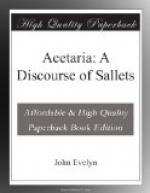Chap. XI. The Description of a Villa.
Chap. XII. The Corollary and Conclusion.
——Laudato ingentia
rura,
Exiguum colito.——
* * * * *
[Illustration]
ACETARIA:
A Discourse of Sallets
* * * * *
Sallets in general consist of certain Esculent Plants and Herbs, improv’d by Culture, Industry, and Art of the Gard’ner: Or, as others say, they are a Composition of Edule Plants and Roots of several kinds, to be eaten Raw or Green, Blanch’d or Candied: simple—and per se, or intermingl’d with others according to the Season. The Boil’d, Bak’d, Pickl’d, or otherwise disguis’d, variously accommodated by the skilful Cooks, to render them grateful to the more feminine Palat, or Herbs rather for the Pot, _&c._ challenge not the name of Sallet so properly here, tho’ sometimes mention’d; And therefore,
Those who Criticize not so nicely upon the Word, seem to distinguish the [4]_Olera_ (which were never eaten Raw) from Acetaria, which were never Boil’d; and so they derive the Etymology of Olus, from Olla, the Pot. But others deduce it from [Greek: Olos], comprehending the Universal Genus of the Vegetable Kingdom; as from [Greek: Pan] Panis; esteeming that he who had [5]_Bread_ and Herbs, was sufficiently bless’d with all a frugal Man cou’d need or desire: Others again will have it, ab Olendo, i.e. Crescendo, from its continual growth and springing up: So the younger Scaliger on Varro: But his Father Julius extends it not so generally to all Plants, as to all the Esculents, according to the Text: We call those Olera (says [6]_Theophrastus) which are commonly eaten_, in which sense it may be taken, to include both Boil’d and Raw: Last of all, ab Alendo, as having been the Original, and genuine Food of all Mankind from the [7]Creation.
A great deal more of this Learned Stuff were to be pick’d up from the Cumini Sectores, and impertinently Curious; whilst as it concerns the business in hand, we are by Sallet to understand a particular Composition of certain Crude and fresh Herbs, such as usually are, or may safely be eaten with some Acetous Juice, Oyl, Salt, &c. to give them a grateful Gust and Vehicle; exclusive of the [8][Greek: psuchrai trapezai], eaten without their due Correctives, which the Learned [9]_Salmasius_, and, indeed generally, the [10]old Physicians affirm (and that truly) all Crude and raw [Greek: lachana] require to render them wholsome; so as probably they were from hence, as [11]_Pliny_ thinks, call’d Acetaria: and not (as Hermolaus




